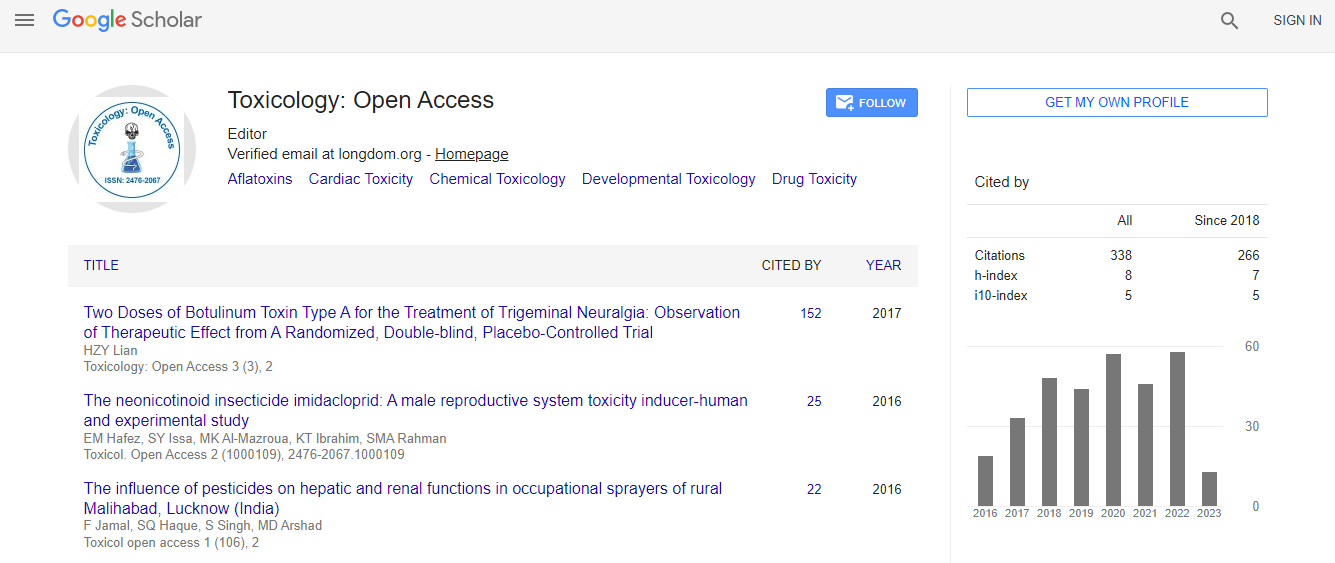Our Group organises 3000+ Global Conferenceseries Events every year across USA, Europe & Asia with support from 1000 more scientific Societies and Publishes 700+ Open Access Journals which contains over 50000 eminent personalities, reputed scientists as editorial board members.
Open Access Journals gaining more Readers and Citations
700 Journals and 15,000,000 Readers Each Journal is getting 25,000+ Readers
Google Scholar citation report
Citations : 336
Toxicology: Open Access received 336 citations as per Google Scholar report
Indexed In
- Google Scholar
- RefSeek
- Hamdard University
- EBSCO A-Z
- Geneva Foundation for Medical Education and Research
- Euro Pub
- ICMJE
Useful Links
Related Subjects
Share This Page
Protective effects of caffeic acid on Acrylamide induced toxicity in rats
8th World Congress on Toxicology and Pharmacology
Sadhana Shrivastava, Chhavi Uthra and Sangeeta Shukla
Jiwaji University, India
ScientificTracks Abstracts: Toxicol Open Access
Abstract
Statement of Problem: Studies concerning toxicity of Acrylamide and its metabolite - glicydamide showed neurotoxic and genotoxic effect. Acrylamide (AA) is a synthetic chemical compound which is used in industry plastics, paints, cellulose-paper, cosmetic industries and its forms in some starchy foods during high-temperature cooking. Caffeic acid is a hydroxycinnamic acid found in barley grain and is an active antioxidant which scavenges free radicals. The present investigation was planned to investigate the therapeutic effect by caffeic acid against AA. Methodology & Theoretical Orientation: AA was administered at the dose of 19.13 mg/kg, p.o. for 28 days to albino rats followed by therapy with 20 mg/kg, p.o. of caffeic acid for 7 days. Findings: Significant increase in serum albumin, bilirubin, triglyceride, cholesterol, SALP, LDH, GGT, ALAD, ALAS was noted, as compared to the control group. Urea and creatinine was also increased, which indicated renal damage. Activity of acetylcholisterase and antioxidant defense system enzymes such as glutathione reductase (GR), glutathione peroxidase (GPx) and glutathione-S-transferase (GST) were decreased in all tissues significantly after AA administration. Histopathological observation also supported biochemical studies as AA caused degeneration in the hepatocytes, hypercellularity in glomeruli and hypertrophy in epithelial cells and disorganization in the neurons. Conclusion & Significance: This study has shown that caffeic acid protects against AA toxicity.Biography
Sadhana Shrivastava has completed her PhD and Post-doctoral studies from Jiwaji University. She is currently working as a Scientist in DHR funded project. She has published more than 45 papers in reputed journals and books. She has been awarded many national awards and fellowships.
Email: dr_sadhana59@rediffmail.com

 Spanish
Spanish  Chinese
Chinese  Russian
Russian  German
German  French
French  Japanese
Japanese  Portuguese
Portuguese  Hindi
Hindi 